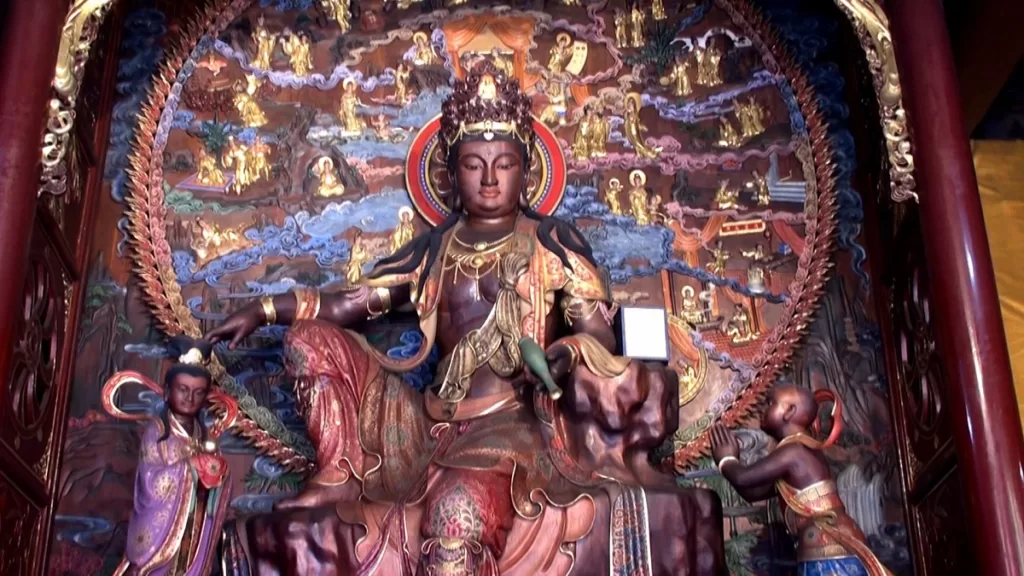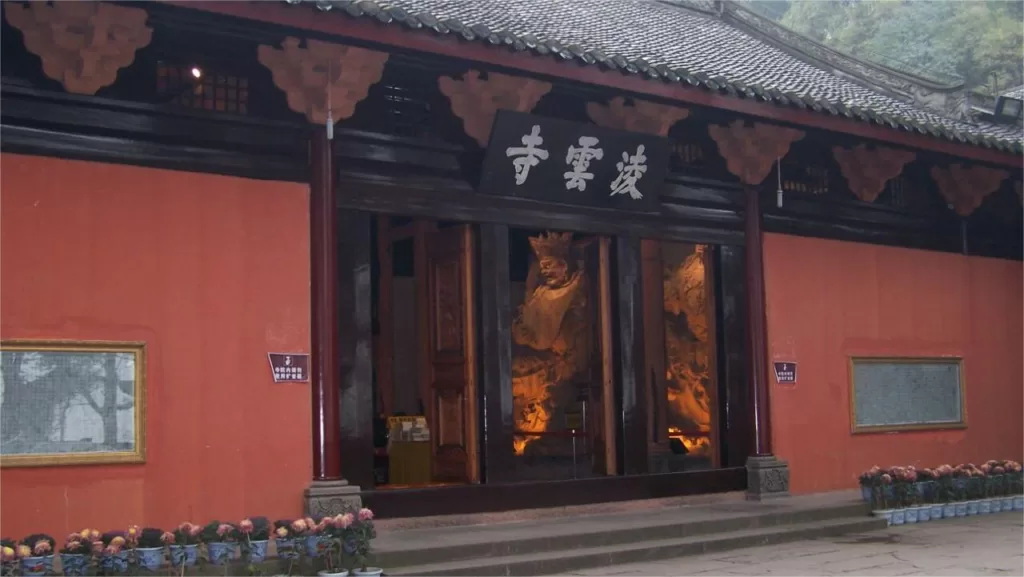Lingyun Temple (凌云寺), also known as Dafo Temple, stands gracefully on the slopes of the Qiluan Peak in the Lingyun Mountain in Leshan, adjacent to the renowned Leshan Giant Buddha. Originally established during the Tang Dynasty, the temple fell into disrepair over time but was later reconstructed in the Ming and Qing Dynasties, transforming it into the magnificent complex that graces the landscape today.
The architectural ensemble of Lingyun Temple consists of three main structures: the Hall of Heavenly Kings, the Mahavira Hall, and the Scripture Hall, arranged in a triple courtyard configuration. The entire complex is surrounded by crimson walls adorned with emerald-green tiles, harmoniously set amidst the lush greenery of trees.
Table of Contents
- Basic Information
- Location and Transportation
- Highlights of Lingyun Temple
- Useful Tips from Genuine Reviews
Basic Information
| Estimated Length of Tour | About 1 hour |
| Ticket Price | The ticket is included in the ticket for the Leshan Giant Buddha. You do not need to pay extra money for the temple. |
| Opening Hours | 8.00 -18.00 |
| Telephone Number | 0086-0833-2355557 0086-0833-2126582 |
Location and Transportation
Lingyun Temple is located in close proximity to the famous Leshan Giant Buddha, in the city of Leshan, which is situated in the southwestern part of Sichuan Province, China. In fact, it is right en route to the Giant Buddha if you enter the scenic area from the north gate.
To get to the north gate, you can take bus 3, 13, 601, or k1, get off at Guicheng Mountain Stop (龟城山站), and walk about 700 meters to the southwest.
Highlights of Lingyun Temple

Before the Hall of Heavenly Kings stands ancient towering cedar trees, while on both sides of the hall, four stone steles from the Ming and Qing Dynasties bear inscriptions attesting to the temple’s restoration. The central figure inside the Hall of Heavenly Kings is a seated Maitreya Buddha, known colloquially as the “Laughing Buddha” due to his rotund figure and joyful countenance. Flanking him are four Heavenly Kings, each portrayed with stern expressions and imposing vigor. Behind the Hall of Heavenly Kings is the Weituo Hall, dedicated to the guardian deity Weituo, represented by a wooden statue embellished with gold leaf.
Passing through the Hall of Heavenly Kings, one arrives at the Mahavira Hall, a splendid structure dating back to the Ming Dynasty. This hall serves as the primary venue for religious ceremonies conducted by the Buddhist monks. At its center is an exquisitely carved trinity of statues representing the three bodies of Gautama Buddha: the Dharma Body, the Response Body, and the Transformation Body. The depictions are elegant and dignified, surrounded by eighteen Arhats, each sculpted with unique features and lifelike realism.

At the back of Mahavira Hall, one discovers the newly sculpted statue of Guanyin, the Bodhisattva of Compassion, flanked by representations of Manjushri, Samantabhadra, Ksitigarbha, and Mahasthamaprapta. These sculptures, attributed to a period preceding the Ming Dynasty, add a historical and artistic depth to Lingyun Temple.
The final structure within the temple complex is the Scripture Hall, originally designed to house Buddhist scriptures and reconstructed in 1930. A testament to modern architectural styles, this hall exhibits a unique charm within the traditional temple setting. An intriguing addition is the “Haishi Hall” on the lower floor, featuring full-body statues of the esteemed builders of the Leshan Giant Buddha: Master Haitong, Master Zhangchou Jianqiong, and Master Weigao. This addition serves as a gesture of reverence from later generations to these venerable figures.
Useful Tips from Genuine Reviews
Historical Significance: Lingyun Temple, constructed almost a century earlier than the Giant Buddha, is a millennium-old temple also known as Baoguo Temple. It is reputed to be highly effective for wish fulfillment, and the temple is bustling with devotees and worshippers.
Wishing Tradition: Lingyun Temple is renowned for its efficacy in wish fulfillment, and it is believed that wishes made here come true. The temple experiences a high level of incense burning, indicating its popularity among visitors seeking blessings.
Traditional Respect: Adhering to the traditional customs of Chinese Buddhism, visitors are advised not to step on the threshold when entering temple halls, as it is considered disrespectful.
Commercial Street: Adjacent to Lingyun Temple, there is a commercial street in front of the Lingbao Pagoda. This area features a variety of souvenirs and mementos, and it is noted that prices here are generally more affordable compared to those within the temple grounds.

